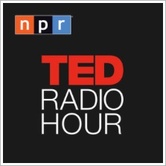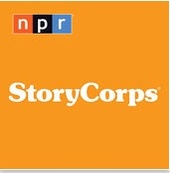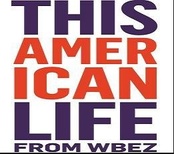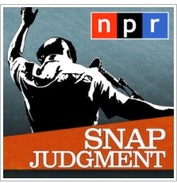|
I commute from one side of the city to the other every morning through Los Angeles' epic rush hour(s) traffic, so I spend a lot of time in my car. And as much as I love NPR news, there is only so much time I can spend listening to Morning Edition and All Things Considered before I am hungry for something else. A few years back I started exploring and subscribing to podcasts, and they've had an added benefit: not only do they entertain me during the long ride, they often inspire my lesson planning. Many of my favorites are also NPR radio shows, but the podcast format has allowed me to broaden my options outside rush hour. The podcast Serial made news this past year when it became the most popular podcast in the U.S., Canada, the U.K, and Australia. This narrative-style investigation of a 15-year old murder case became a "global phenomenon," and some English teachers abandoned their plans and instead had their students listen to the podcast during class and discuss it. KQUD's Mindset recently published an article about the ways teachers are using podcasts in the classroom: "A growing number of educators who are using podcasts like 'Serial' to motivate their classrooms and address education requirements set by the Common Core state standards. Improving students’ listening skills is one of the essential components of the new education mandates, and using audio in the classroom can be an effective way to promote listening." Aside from teaching listening skills, however, my podcast obsession seems to work best to supplement my existing curriculum and broaden our classroom discussions. For example, Radiolab did a fascinating (and somewhat terrifying) episode called "Memory and Forgetting" last year. As I listened to how easily human memory can be manipulated, it hit me: how great would it be to listen to part of this hour with my AP Lit class when we read Orwell's 1984? Or what about using one of the excerpted TED talks featured on the TED Radio Hour in the episode called "Memory Games"? When teaching about the socially constructed nature of race in my American Literature class, the episode "Pike County, OH: As Black as We Wish to Be" on State of the Re:Union became the catalyst for one of the best discussions we had all year. It came up again and again as we read Toni Morrison and Mark Twain. Or to talk about podcasts as an alternative form of journalism in my 21st Century Journalist class, why not listen to the 99% Invisible episode "Under the Moonlight" about how a serial killer in Austin and fears about the dark led to the creation of "moonlight towers"? 99% Invisible is a show about design, so I could also see arts and engineering teachers finding myriad ways to integrate it in their classroom. Trying to help graphic design students understand the power of a symbol? Listen to "Designing a Nuclear Waste Warning Symbol That Will Still Make Sense in 10,000 Years." For that matter, why not use this episode to talk about literary symbolism? My student newspaper Lifestyle editor might benefit from listening to the entertainment roundtable Pop Culture Happy Hour, one of my favorite shows. Could we work this type of a program into our Arts & Entertainment section? I rarely go more than a day without thinking, "I could use that!" Here are some of the podcasts (aside from Serial, which is on hiatus) currently inspiring me. Some of these also broadcast on public radio, but I listen to them all via the podcast app on my phone. What are your favorites? I'd love to hear about them in the comments.  I mentioned in an earlier post how much I love TED talks, and the TED Radio Hour is where I find most of them. Each episode includes approximately five talks around a common theme or topic. The host Guy Raz weaves excerpts from the original talks together with interviews from the speaker. No matter what you teach, this show will have a lot of options for you to explore.  Radiolab mixes science with storytelling and creates magic. This is the show I used to explore memory manipulation in Orwell's 1984, and I get ideas for other literary connections all the time when I listen. If you teach journalism, you must listen to the hilarious podcast extra from "Happy Birthday, Bobby K" in which co-host Robert Krulwich tells an epic tale of chasing the ultimate story involving alligators and a marching band.  State of the Re:Union is a fantastic show for American literature, history and geography. Its slogan is "Telling the story of America, one community at a time," and its homepage features an interactive map of the country. You can click on any state to see stories from that area.  99% Invisible calls itself "a tiny show about design," but because it explores such an eclectic range of topics, it connects to my class in unexpected ways. An obvious must for any design or architecture teacher, but I'd argue you could find a way to connect some of the episodes to almost any subject.  StoryCorps features real stories told by real people. From their site: "Since 2003, StoryCorps has collected and archived more than 50,000 interviews with over 90,000 participants. Each conversation...is preserved at the American Folklife Center at the Library of Congress. StoryCorps is one of the largest oral history projects of its kind." I love it also because you can search the site by theme. About to teach Romeo and Juliet? Have students listen to a few stories about love. Reading How the Garcia Girls Lost Their Accents? Take a listen to real immigration stories. It's a great resource.  This American Life is in many ways the radio show that started it all. According to its website, it's often the most popular podcast in the country, and for good reason. With fascinating themes, deep investigation, and twenty years of storytelling experience, it's endlessly inspiring. I believe the the recent episode "Three Miles" should be mandatory listening for every teacher--heck, every person--in the country.  Code Switch bills itself as "a team of journalists fascinated by the overlapping themes of race, ethnicity and culture, how they play out in our lives and communities, and how all of this is shifting." I'm cheating a little here since it's primarily a blog, but it's too good to leave off.  Snap Judgment's slogan is "storytelling with a beat," and it's one of my favorite shows. Each episode has a theme and a mix of fictional and non-fictional stories around that theme. Since every segment is distinct and not too long, it can be a great place to go when I'm looking for a quick story to connect thematically to a book we're reading. As with any of these podcasts, not all stories are appropriate for all grades, but when I find one that works, the students love the way Glynn Washington and his team mix words, sounds and music together.  I probably wouldn't use Pop Culture Happy Hour directly in my classroom (except, perhaps, to inspire my entertainment journalists), but I love it as a way to stay in touch with popular culture--important for a teacher, I think. I also completely adore Linda Holmes and her team. They have a great chemistry and never fail to make me laugh on my way to work Friday morning.
0 Comments
I’m a huge fan of TED talks. If you aren’t familiar with this organization, here is their mission statement: TED is a nonprofit devoted to spreading ideas, usually in the form of short, powerful talks (18 minutes or less). TED began in 1984 as a conference where Technology, Entertainment and Design converged, and today covers almost all topics — from science to business to global issues — in more than 100 languages. Meanwhile, independently run TEDx events help share ideas in communities around the world. I love TED because we can access these ideas wherever we are and whenever we have time. Here are three talks I think everyone--but especially educators and parents--should watch. Angela Lee Duckworth: The key to success? GritAngela Duckworth has her own lab at the University of Pennsylvania dedicated to "two traits that predict achievement: grit and self-control.” This talk summarizes key findings from the 2007 study she co-authored: "Grit: Perseverance and passion for long-term goals.” Many people assume that IQ will predict achievement. What the research found, however, is a far more crucial factor: grit. How resilient we are. How well we can bounce back from failure. Duckworth’s research solidified for me the importance of letting students struggle. Well-intentioned parents are doing their kids no favors when they try to “smooth the way” for them. It’s a great talk. Side note: If you’re curious about your own “grittiness,” why not take this quiz to see how you do? Or maybe have students take it in a class before a discussion? Carol Dweck: The power of believing that you can improveI believe Carol Dweck is one of the most important researchers in the country. When I first read about her research about growth vs. fixed mindset, it profoundly shifted my understanding of intelligence and ability. More importantly, it had a tangible and concrete impact on the way I praise my students. This TED talk is a mere overview (parents, I urge you all to read “How Not to Talk to Your Kids” in tandem with this talk), but it’s a great place to start the conversation. Chimamanda Ngozi Adichie: The danger of a single storyChimamanda Adichie is a gifted Nigerian writer who has won many awards for her novels and short fiction. Her recent novel Americanah won the 2013 National Book Critics Circle Award for Fiction. What I love about this talk, however, is how it speaks to the importance of a rich and diverse literary curriculum. Adichie explores the dangers of a “single story” about any culture. She uses her own experiences as a college student in the U.S. as one example of this: "My American roommate was shocked by me. She asked where I had learned to speak English so well, and was confused when I said that Nigeria happened to have English as its official language. She asked if she could listen to what she called my "tribal music," and was consequently very disappointed when I produced my tape of Mariah Carey.... My roommate had a single story of Africa: a single story of catastrophe. In this single story, there was no possibility of Africans being similar to her in any way, no possibility of feelings more complex than pity, no possibility of a connection as human equals." We all have single stories due to a lack of exposure to other cultures, she argues, and she uses a trip to Mexico to show how she, too, fell prey to this trap. It’s a beautiful, powerful, and funny talk. |
About“And though she be but little, she is fierce!” -A Midsummer Night’s Dream Archives
December 2020
Categories
All
|

 RSS Feed
RSS Feed